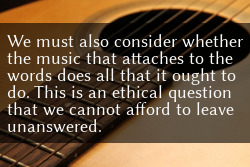 Reposted, with permission, from Theologically Driven.
Reposted, with permission, from Theologically Driven.
WikiAnswers poses the question, “Why does music exist?” then self-replies: “Because it brings happiness to people all over the world.”
We must grant that WikiAnswers is scarcely an authoritative reference source, but it does offer a window on popular culture. It reflects that a common reason (and perhaps the most common reason) for the societal “doing” of music today is to forget the pain, grief, anxiety, dreariness, and simple ennui of life and enter an imaginary world where one can have the emotional experience of his choice—usually a happy one. Ironically, the historically central idea of “music” (fr. the Grk. μοῦσα, to muse, think, remember, or reflect) has been transformed in the last century into its own etymological opposite—an occasion, whether active or passive, for not “musing,” or, supplying the alpha privative, a venue foramusement. This is not to say that music as amusement or as a means of forgetting is always bad (see in principle Prov. 31:7), but it does reflect a total reversal of the Western tradition concerning the central purpose of music.
Of course, history only slightly improves on Wiki in terms of warrant. Still it is interesting to know that the perceived function of music from the classical period to the rise of populism was as an aid to musing and remembering, or perhaps better, as a means to creating the affective distance necessary to fostering reflection.


 Reposted, with permission, from
Reposted, with permission, from  They may not be many in number, but they do exist: Christians who are thoroughly confused about anger. During counseling, reading, and sermon-listening, four myths have come to my attention repeatedly. Here’s a brief, non-expert—but hopefully thought-provoking—response.
They may not be many in number, but they do exist: Christians who are thoroughly confused about anger. During counseling, reading, and sermon-listening, four myths have come to my attention repeatedly. Here’s a brief, non-expert—but hopefully thought-provoking—response.
Discussion